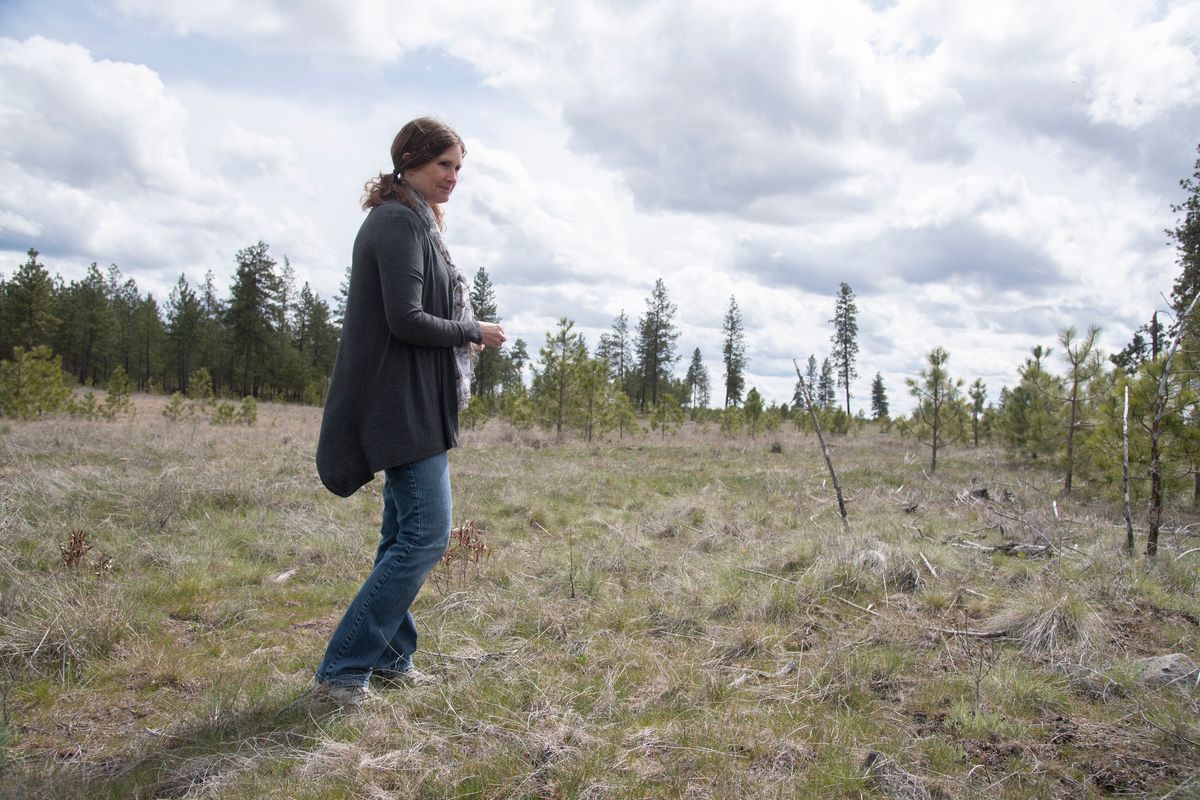‘It’s worth fighting for’: Spokane County neighborhood takes on gravel pit expansion

Sometimes moose pass through this 156-acre patch of ponderosa and meadow.
So do deer. And cougars. Even elk, once in a blue moon.
This property, northeast of Cheney and 3 miles south of Interstate 90, is a relatively untouched natural area full of wildflowers and young pines. The neighbors like it that way.
“It’s a delightful area to live near,” said Rick Hosmer, whose house sits on the east side of the property.
But Hosmer and other area homeowners fear it might not be delightful much longer. A North Idaho paving company hopes to turn it into a gravel pit.
Poe Asphalt, the business that bought the property last year for $1.9 million, wants Spokane County to rezone it from rural conservation land to mining land. Rural conservation is a zoning designation the county uses to preserve open space and protect environmentally sensitive areas, including wildlife corridors. Development and mining are allowed on those lands, but changing the zoning would give Poe Asphalt more leeway to do what it wants on the property.
People who live near the 156 acres are fighting Poe Asphalt’s proposal. They argue the mining operation would have negative environmental impacts and make their lives worse by creating noise, removing wildlife habitat, degrading air quality, threatening residential groundwater wells and lowering home values.
Spokane County supports Poe Asphalt’s proposal. In 2020, the Planning Commission and county commissioners both approved the requested zoning change unanimously.
County Commissioner Al French, whose district includes the 156 acres, declined to comment on Poe Asphalt’s plans. He said legal counsel advised him not to interfere because the decision now rests with the Spokane County hearing examiner. French didn’t explain why he voted in favor of the rezone.
Spokane County Building and Planning staff say the gravel pit wouldn’t have any significant adverse impacts on the environment.
Zak Griefen, an environmental lawyer representing the Hanskutt Hills neighborhood group, said in a public hearing this month that staff are wrong.
“It’s beyond belief that that level of impact was determined to have no significance,” Griefen said. “They made a mistake.”
The hearing examiner will decide who’s right.
On April 13, Hearing Examiner Chris Anderson listened to arguments for and against the zoning change and determination of nonsignificance.
Anderson acts as a judge for controversial land use decisions and his ruling, which should come out in the next few days, is final unless overturned by a Superior Court judge.
Poe Asphalt did not respond to requests for comment, but if the company gets approval to mine, it intends to begin a 30-year gravel operation.
The Grove Road gravel pit would produce 150,000 tons of aggregate a year, or 473 tons a day. Poe Asphalt would operate the pit six days a week and the operation would require an average of 60 truck trips – 30 round trips – a day.
Poe Asphalt won’t mine the entire property at once. The mining would occur in phases, with roughly 20-30 acres in production at any given time. The pit could be as deep as 220 feet in some spots.
If the new gravel pit opens, it won’t be the first in the area, Poe Asphalt stressed. Five other gravel pits exist within 2 miles of the site. Poe bought a 70-acre gravel pit last year for $3.2 million that borders the 156 acres.
Neighbors say they already experience some negative impacts from the active gravel pits.
“If they (Poe Asphalt) were living out here they’d be fighting just as hard to stop this,” Jennie Sweet said in an interview.
The new pit would be ugly to look at and lower property values, neighbors said. Multiple area residents said the new gravel pit would completely change their way of life.
“People move out to rural because they want peace and quiet and tranquility,” Diane Huber said in an interview.
Noise is a major concern. Locals said they don’t want to hear backup beepers, rocks crashing into metal truck beds and the sound of gravel crushing.
In addition to heavy machinery, gravel mining also requires blasting, and people who live near the mine don’t want to listen to the explosions.
Sweet said the blasts shake her house. Heidi Smith, a horse trainer whose property borders the 156 acres, said explosions will spook horses.
“If there’s just loud booms going on, it’s a threat,” Smith said, explaining that horses can throw riders when startled.
Neighbors also worry the gravel pit could impact their wells.
During the April 13 public hearing, Griefen interviewed Kevin Freeman, a geologist and hydrology expert the neighborhood group hired as a consultant.
Freeman emphasized there isn’t detailed hydrological data for the area. But he said that after analyzing state Department of Ecology well depth records, he believes it’s possible that the gravel pit could cause residential wells to run dry.
The pit might “intersect this water-bearing zone that a number of these residents appear to be drawing their well from,” said Freeman, who also serves as the mayor of Millwood.
If that happens, water could flow into the pit.
“If you’ve ever seen gravel pits, they end up ultimately with a lake,” neighborhood resident Coleen Quisenberry said in an interview.
Neighbors are also worried about Poe building an asphalt plant that would produce unhealthy and unpleasant fumes. Neighbors say they have seen evidence of new gas-line installation at the gravel pit and are concerned that indicates construction of an asphalt plant is imminent.
The Spokesman-Review reached out to Spokane County Building and Planning and Poe Asphalt to confirm the asphalt plant’s construction but did not receive any responses.
The gravel pit battle might not end with the hearing examiner’s ruling. It would drag on if the neighborhood group appeals the decision to Superior Court.
“It’s worth fighting for,” Hosmer said.